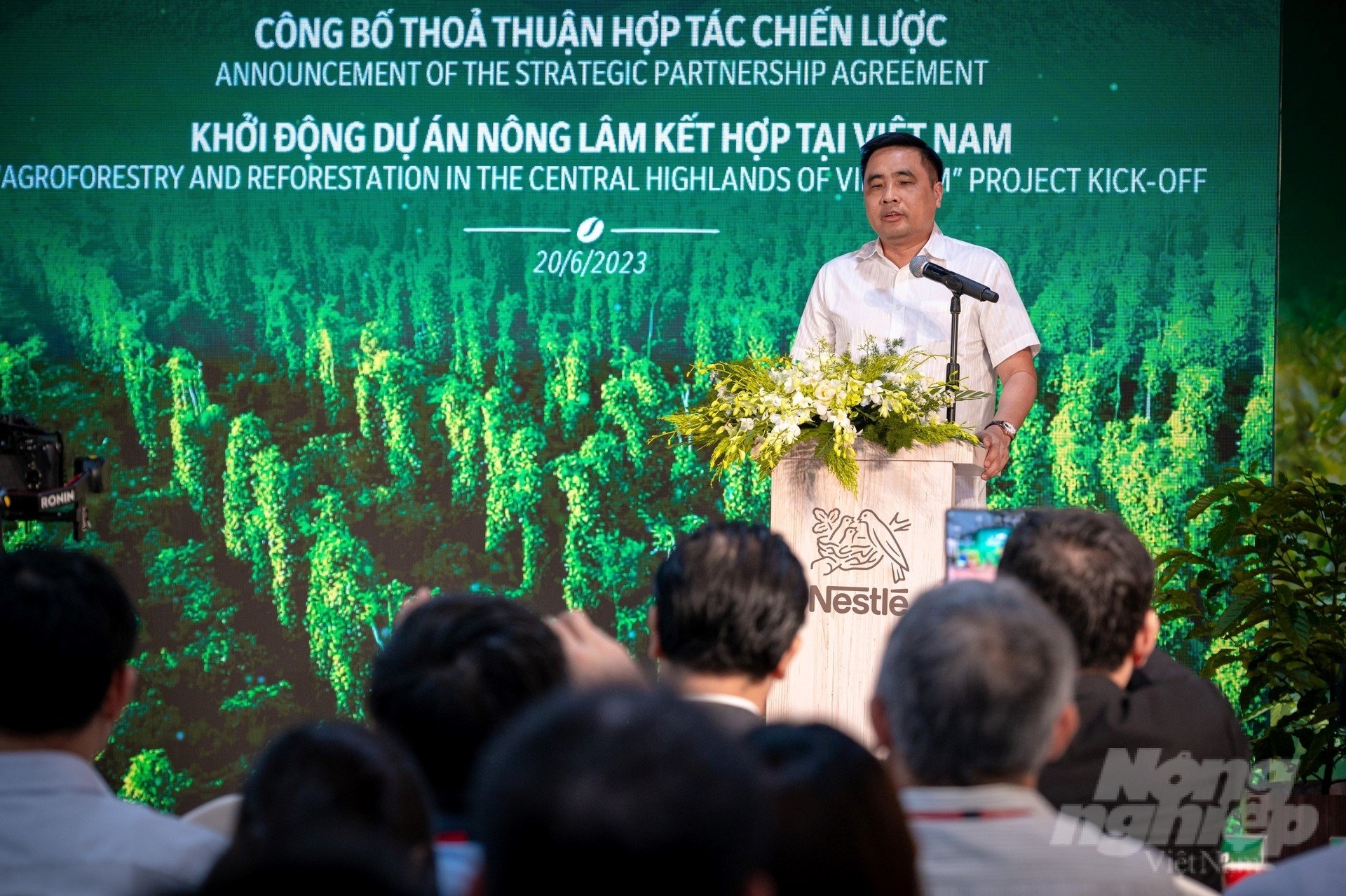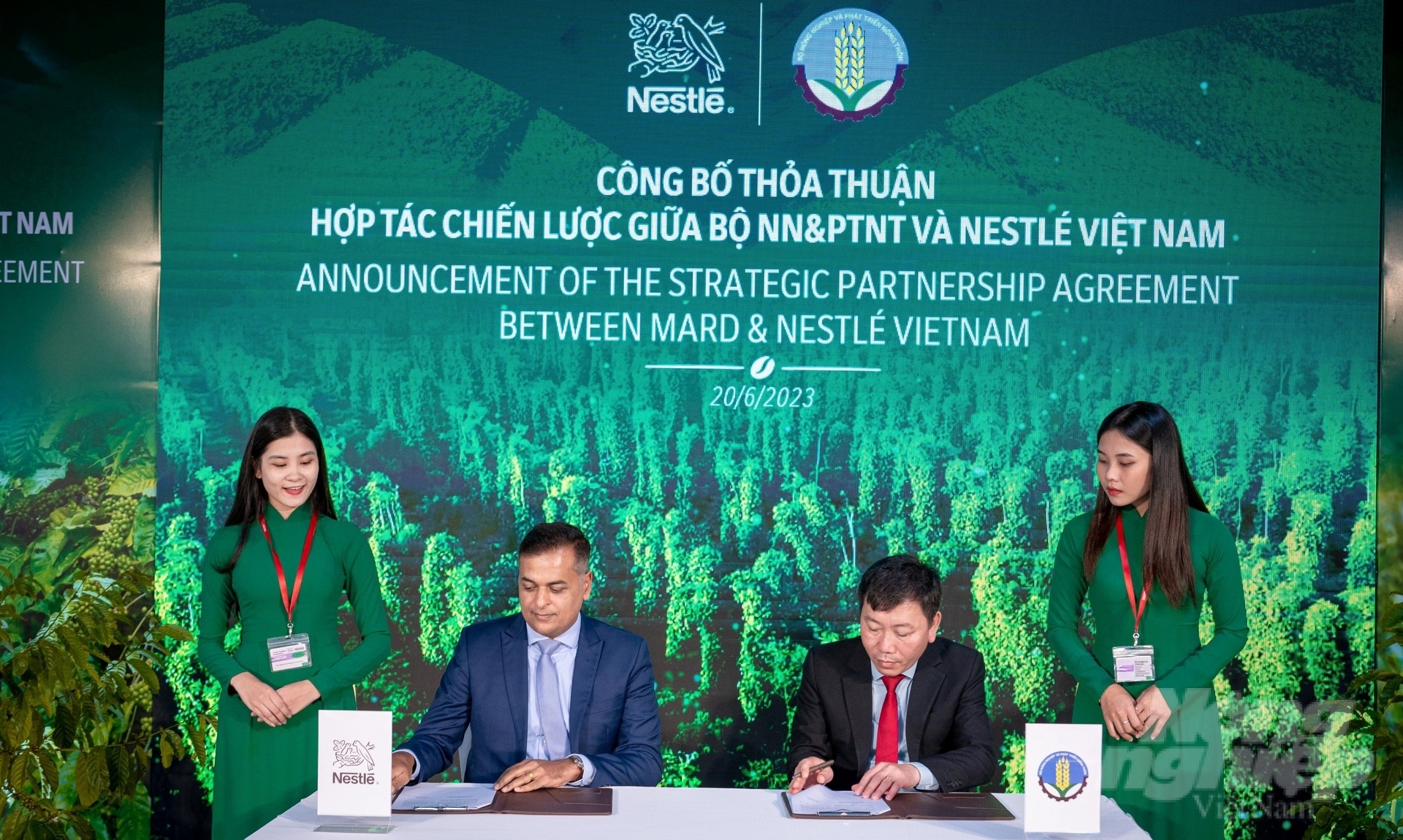May 21, 2025 | 08:06 GMT +7
May 21, 2025 | 08:06 GMT +7
Hotline: 0913.378.918
May 21, 2025 | 08:06 GMT +7
Hotline: 0913.378.918

Deputy Minister Nguyen Quoc Tri spoke at the event. Photo: TS.
Within the framework of the “Agroforestry Initiative” project just approved on June 20, the Western Highlands Agro-Forestry Scientific and Technical Institute (WASI) and the Tay Nguyen University have just implemented the project “Agroforestry and Reforestation in the Central Highlands of Vietnam” at Nestlé Tri An factory, Dong Nai. With the implementation of the project, over 2.3 million trees will be planted, contributing to the progress of Vietnam's 1 billion tree planting program.
Speaking at the ceremony, Deputy Minister Nguyen Quoc Tri said that the Ministry of Agriculture and Rural Development (MARD) highly appreciated the close cooperation of Nestlé Vietnam Co., Ltd. when organizing the project “Agroforestry and Reforestation in the Central Highlands of Vietnam”.
Deputy Minister Nguyen Quoc Tri affirmed that Vietnam's agriculture plays a particularly important role in ensuring food security, social stability, and livelihoods for over 60% of the population living in rural areas and contributes 14.85% of the country's GDP.
Currently, Vietnam's agriculture sector is moving towards ecological, low-emission, and sustainable agriculture associated with improving livelihoods for rural people. At the COP26 Conference on Climate Change, Prime Minister Pham Minh Chinh made a commitment that Vietnam strives to reduce methane emissions by 30% by 2030 and achieve net zero emissions by 2050, as well as affirming Vietnam's participation in the "Global Methane Reduction" and "Glasgow Declaration on Forests and Land Use" initiatives.

Director General of the MARD’s Department of International Cooperation Nguyen Do Anh Tuan signed the Memorandum of Understanding. Photo: TS.
In order to implement the above-mentioned strategy and international commitments, Vietnam needs to make great efforts, not only from the government but also from the private sector, businesses, and direct producers, to jointly implement them at different scales. The joint implementation aims to open up the investment resources of the whole society and transform the production model from "growth in output and productivity using many inputs with intensive resources" to a model of "green, low-emissions, and climate change-adapted" agricultural growth.
"I highly appreciate the cooperation of Nestlé Vietnam Co., Ltd. with the WASI and Tay Nguyen University in implementing the project “Agroforestry and Reforestation in the Central Highlands of Vietnam”. With the implementation of the project, about 2.3 million trees will be planted, contributing to the progress of Vietnam's 1 billion tree planting program.
This project also shows the effective cooperation of public-private investment in ecological, low-emission, and sustainable agricultural development, demonstrating the social responsibility of businesses in addition to production and investment activities", Deputy Minister Nguyen Quoc Tri said at the event.
Nestlé Vietnam Co., Ltd. said the unit is strengthening cooperation with MARD and partners to promote regenerative and low-emission agriculture, contributing to the implementation of the path towards the net zero emission target by 2050.

Delegates at the event. Photo: TS.
On June 20, Nestlé Vietnam and MARD officially announced a Memorandum of Understanding (MOU) on strengthening public-private cooperation to promote sustainable, regenerative, and low-emission agriculture through the Partnership for Sustainable Agriculture in Vietnam (PSAV). This activity is within the framework of a meeting and working session between MARD’s leaders and Mr. Mark Schneider, CEO of Nestlé Group, the world's leading food corporation.
According to the MOU’s content, Nestlé Vietnam will cooperate with MARD within the framework of the PSAV Program to promote and share regenerative agricultural practices towards low-emission agriculture in response to climate change; promote technology transfer and digital transformation through research and development; and promote multilateral cooperation.
Within the framework of the working program, MARD’s leaders and Mr. Mark Schneider, CEO of Nestlé Group, also officially launched the project "Sustainable coffee farming under the agro-forestry model" in Vietnam, aiming to plant more than 2.3 million trees by 2027.
The project aims to both contribute to bringing economic value and creating more income for farmers and provide support to improve the conditions of coffee cultivation, especially by increasing resistance to insects and adaptability to climate change and natural disasters (drought, rainstorms, etc.), improving soil quality, and increasing biodiversity.
It is expected that the project will help absorb and store about 480,000 tons of CO2 in the five-year period (2023–2027), contributing to the transformation to ecological agriculture in coffee cultivation in the Central Highlands.
Mr. Mark Schneider said that "As one of Nestlé's top coffee suppliers, Vietnam is our big priority. Through the Nescafé Plan, we are committed to helping Vietnamese farmers transform to regenerative agriculture to improve their livelihoods and respond to climate change. We are also focusing on implementing the afforestation program here."
The "Agroforestry and Reforestation" initiative is implemented in eight countries by Nestlé Group. In Asia, Vietnam is the fourth country to have applied for this initiative.
The initiative aims to conserve land, reduce the effects of climate change, promote biodiversity, and increase farmers' incomes. The Nestlé Group sets a target of planting 200 million trees globally by 2030, contributing to the goal of net zero emissions by 2050.
Translated by Huyen Vu Thu

(VAN) Japan's grant aid project contributes to capacity building, promoting organic agricultural production, and fostering sustainable community development in Dong Thap province.

(VAN) For years, the CRISPR-Cas9 genome technology has been reshaping genetic engineering, a precision tool to transform everything from agriculture to medicine.

(VAN) Vietnam aims to become a 'leader' in the region in the capacity and managing effectively soil health and crop nutrition.
![Reducing emissions from rice fields: [Part 1] Farming clean rice together](https://t.ex-cdn.com/nongnghiepmoitruong.vn/608w/files/news/2025/05/05/z6509661417740_a647202949c539012a959e841c03e1d3-nongnghiep-143611.jpg)
(VAN) Growing clean rice helps reduce environmental pollution while increasing income, allowing farmers to feel secure in production and remain committed to their fields for the long term.
/2025/05/19/5136-1-144800_230.jpg)
(VAN) The Nghe An Provincial People's Committee has just approved the list of beneficiaries eligible for revenue from the Emission Reductions Payment Agreement (ERPA) in the North Central region for the year 2025.

(VAN) 14 out of 35 domesticated elephants in Dak Lak province have had their living conditions improved, with 11 of them currently participating in the non-riding elephant tourism model.

(VAN) Muong Nhe Nature Reserve hopes that being upgraded to a national park will lay the foundation for forest protection efforts to be carried out in a systematic, modern, and sustainable manner.